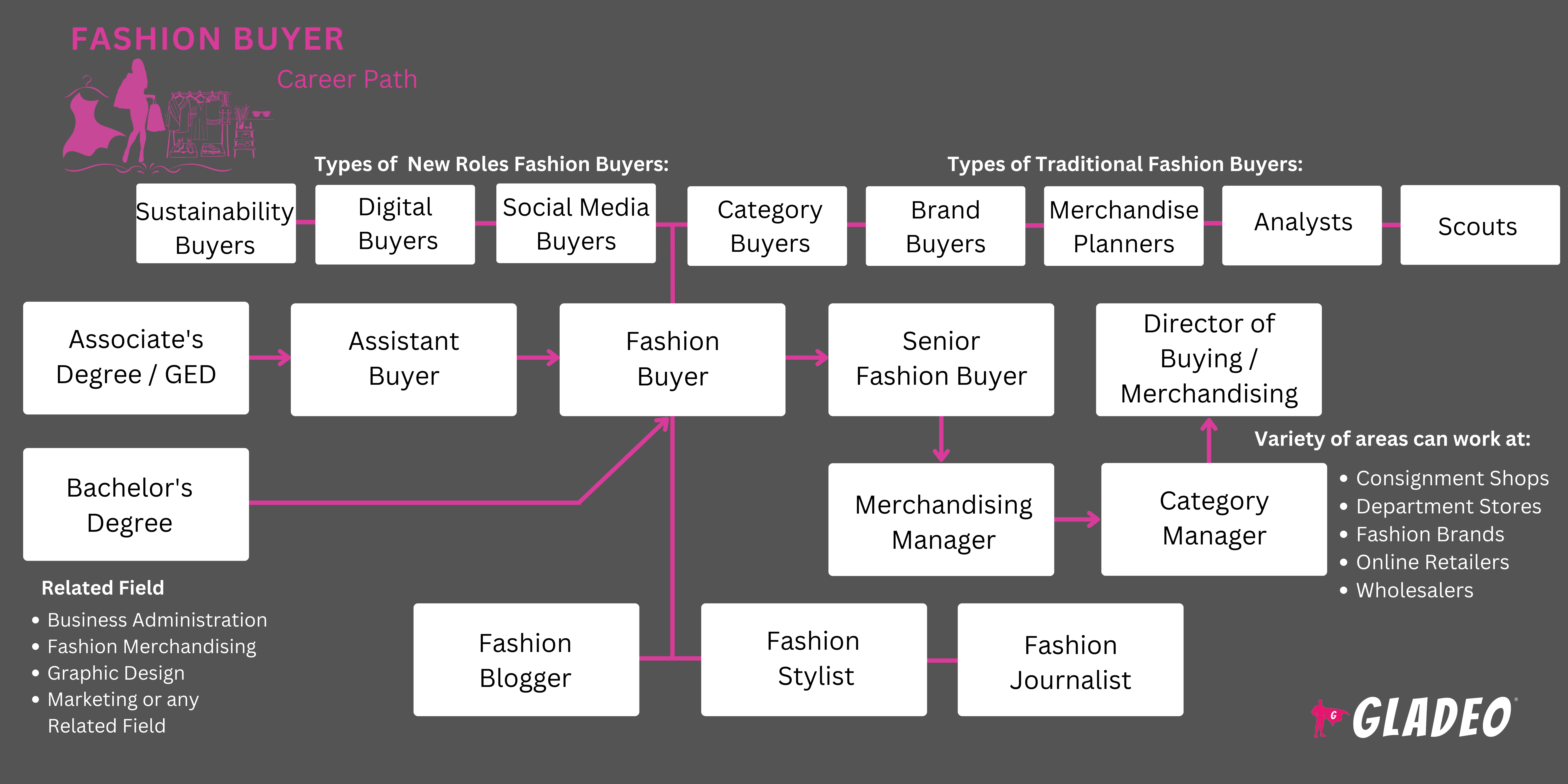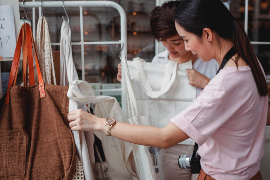Focos de atención
Retail Buyer, Apparel Buyer, Accessories Buyer, Fashion Merchandiser, Fashion Purchasing Specialist, Fashion Category Manager, Fashion Sourcing Specialist, Trend Analyst, Fashion Curator, Fashion Consultant, Fashion Product Developer, Merchandise Buyer
What we wear is often an expression of our personal styles. But our choices in fashion usually come from stores, such as mall shops, big retail chains, or online clothing businesses.
And where do those places get their merchandise? Often from third-party vendors! That’s why they may employ Fashion Buyers, experts who keep up with trends and look for apparel items they think will suit their employers’ brand and customer base.
Fashion Buyers work closely with designers, merchandisers, and suppliers to secure the best pieces for upcoming seasons. They may attend shows or trade fairs to see what’s new and upcoming. They also negotiate prices and conditions with suppliers, manage budgets, and forecast sales trends to maximize profitability. Ultimately, it’s up to them to ensure the businesses they work for can offer the best mix of products to meet their specific market’s needs!
- Working at the forefront of fashion trends and market shifts
- Discovering new designers and unique pieces
- Seeing how your fashion selections resonate with customers and drive sales
- Contributing to the brand’s image and success
Horario de trabajo
- Fashion Buyers typically work full time, and may have irregular hours during fashion weeks, trade shows, or buying seasons. Frequent travel may be necessary.
Tareas típicas
- Research brands and designers by: going to fashion shows, trade fairs, and showrooms; reviewing catalogs and websites; and using fashion trend forecasting services
- Analyze market trends and consumer behavior to predict future demand
- Select garments and accessories based on trend predictions, profitability potential, and employer brand suitability
- Work with the employer’s merchandising team to budget for new collections
- Collaborate with sales teams to determine which items to promote or discount
- Develop range plans covering the quantities of items to be bought, illustrations of each item, sizes, costs, selling prices, fabrics, colors, and other details
- Negotiate with suppliers on prices, quantities, and delivery timelines
- Review competitor pricing; calculate profit margins and set pricing
- Maintain good relationships with global suppliers. Scout for new supplies to ensure variety and fairness
- Ensure products are shipped and delivered promptly
- Verify that products meet quality standards
- Stay informed about sustainable and ethical fashion practices
- Monitor product sales performance and adjust future purchases as needed
Responsabilidades adicionales
- Take professional development courses to keep up with fashion trends, retail strategies, and technological advancements
- Attend strategy meetings and make presentations
- Train and mentor new fashion-buying staff
Habilidades blandas
- Adaptabilidad
- Analítica
- Atención al detalle
- Colaboración
- Creatividad
- Conciencia cultural
- Servicio de atención al cliente
- Decisivo
- Flexibilidad
- Independiente
- Innovador
- Interpersonal and communication skills
- Negociación
- Problem-solving ability
- Strategic
- Gestión del tiempo
- Trend-savvy
Habilidades técnicas
- Creative vision to conceptualize product ranges
- Ethical sourcing
- Math and financial acumen related to finance, economics, budgeting, and managing profit margins
- Knowledge of logistics and supply chain
- Market research and data analysis to inform buying decisions
- Negotiation skills to secure favorable terms with suppliers
- Organization, including keeping records and managing multiple timelines
- Proficiency in using retail software and forecasting tools
- Strategic planning for product selection and inventory
- Trend forecasting to find apparel that aligns with the employer’s brand identity
- Visual Merchandising
- Fashion retailers and department stores
- Online fashion marketplaces
- Luxury brand boutiques
- Wholesale fashion distributors
To be a successful Fashion Buyer requires a mix of analytical skills and a passion for fashion! Their ability to identify and procure the most suitable merchandise has a deep impact on their employer’s brand reputation and profitability.
Finding quality products that customers want and can afford is crucial. But it’s also important to ensure that the products can be made and delivered on time and sold at a sufficient markup to cover costs and provide a profit. Travel can be a big part of the job, but that’s what it takes to get out there and find the right merchandise that will appeal to consumers!
Overall, the fashion industry is facing some challenges due to economic slowdowns. While many luxury brands continue to rake in profits, other companies are struggling to navigate through the turmoil.
Outside of the US, the industry may slow down even more. Brands will have to stay vigilant when it comes to their spending and may need to try new approaches to target different markets. A key trend has been the consumer shift to authenticity, sustainability, and ethical business practices. Tied to this is the trend of customers engaging more with the brands they choose to do business with.
Individuals drawn to this career often had a passion for fashion, retail, and trends from a young age. They might have enjoyed thumbing through fashion magazines, following social media influencers, or experimenting with their own unique styles!
- Fashion Buyers need a combination of education and practical industry experience
- Employers usually want candidates with a bachelor’s degree in fashion merchandising, fashion marketing, fashion design, graphic design, business, or marketing
- If your degree isn’t directly related to fashion, you can still earn a certificate such as The New School’s Fashion Buying and Merchandising Certificate
- Los temas habituales de los cursos universitarios pueden incluir:
- Brand Management
- Consumer Behavior
- Análisis de datos
- Fashion Trend Forecasting and Marketing
- Fashion Merchandising
- Global Fashion Industry
- Logística
- Market Research
- Retail Buying and Planning
- Retail Financial Management
- Sustainable Fashion
- Textile Science
- Students can gain relevant work experience via internships, work placement, part-time retail jobs, or even retail apprenticeships
- Las certificaciones opcionales incluyen:
- American Purchasing Society - Certified Purchasing Professional
- Association for Supply Chain Management - Certified in Production and Inventory Management
- Institute of Commercial Payments - Certified Purchasing Card Professional
- SAP America, Inc. - SAP Certified Application Associate - SAP Ariba Contracts
- A graduate degree isn’t needed, but it may help qualify you for higher-paying positions. An option to consider would be an MBA in Fashion Retail Management
- Scout universities with strong connections to the fashion industry. Look for programs offering comprehensive coursework in fashion merchandising and retail management.
- Check out their internships, cooperative education, and study-abroad opportunities.
- Consider the affordability of the program and the availability of financial aid!
- In high school, study subjects like business, supply chain, fashion, creative design, marketing, art, photography, and cultural or sociology topics
- Decide what you want your college major to be and where you want to apply
- Participate in internships or snag part-time jobs in retail to gain experience
- Attend fashion events, trade shows, and exhibitions to network and spot trends
- Develop skills in negotiating, visual merchandising, trend forecasting, and digital marketing
- Join fashion or business-related clubs and organizations
- Review fashion blogs, magazines, videos, and influencer social media
- Consider creating your own fashion-related blog or portfolio!
- Keep track of the things you’re learning and include them on a working resume
- Talk to the people you’d like to serve as your personal references. Get their permission ahead of time to give out their contact information
- Sign up for a short, affordable fashion buying overview course from Udemy or another course provider, to see if you’re really interested in the subject matter or not

- Acude al centro de orientación profesional de tu centro de estudios para que te ayuden a preparar currículos y hacer simulacros de entrevistas.
- Apply for entry-level positions, internships, work placements, or even retail buyer apprenticeships to get experience if needed
- Attend job fairs and networking events focused on the fashion industry
- Update your LinkedIn profile and ask industry professionals in your network for job tips
- Review postings on Indeed, Glassdoor, and other job portals
- Note the keywords in job ads, and incorporate them into your resume where possible, to help it get through the applicant tracking system programs! Common keywords might include:
- Gestión presupuestaria
- Fashion Merchandising
- Gestión de existencias
- Market Analysis
- Product Selection
- Relationship Building
- Planificación estratégica
- Supply Chain Coordination
- Trend Forecasting
- Vendor Negotiation
- Take a look at Fashion Buyer resume templates
- If you’ve done an internship or have prior work experience, update your portfolio to ensure it showcases your ability to forecast trends, conduct effective market analysis, use relevant software, and make solid buying decisions. You could do this through a website, social media, or a combination of both
- Practice replies to Fashion Buyer interview questions in mock interviews
- Fashion trends change frequently, so read up on the latest fashion news and be familiar with the technologies and terminology. Be ready to talk about how you can contribute to the company’s buying strategy
- Dress appropriately for interviews!
- Express your interest in career advancement to your supervisors. Ask for feedback and advice on how you can prepare for higher-level positions
- Seek professional development courses and certifications to boost your credentials, like the American Purchasing Society’s Certified Purchasing Professional
- Consider pursuing a master’s in fashion management or business
- Keep up with software advancements related to data analysis, market research, AI-augmented trend forecasting, etc.
- Volunteer for increased responsibilities like managing larger budgets or complex projects
- Maintain strong relationships with suppliers, designers, and industry insiders
- Consider specializing in a niche area of fashion buying, such as sustainable fashion or luxury brands
- Attend workshops, seminars, and courses to enhance your skills and knowledge
- Travel and get a feel for the styles of other cultures and how they might fit in with your employer’s brand
- Stay active in professional organizations to build your reputation as an industry leader
- Keep your eyes open for new opportunities, within and outside of your employer’s organization
- Consider opening your own consultancy business!
Páginas web
- Sociedad Americana de Compras
- Asociación para la Gestión de la Cadena de Suministro
- B2BMAP
- BizGlobalWeb
- Business of Fashion
- Fashionista
- Fashion United
- Instituto de Gestión de Suministros
- Intertextile Shanghai Apparel Fabrics
- Kompass
- Asociación Nacional de Funcionarios de Contratación Pública
- National Institute of Government Purchasing
- Institute for Public Procurement
- Asociación de Compras Next Level
- Première Vision
- Textilepages
- Texworld
- TradeKey
- Consejo de Certificación de la Contratación Pública Universal
- WGSN
Fashion Blogs
Libros
- Fashion Buying and Merchandising: The Fashion Buyer in a Digital Society, by Rosy Boardman, Rachel Parker-Strak, et al.
- Fashion Buying & Merchandising, by Miguel Hebrero
- Retail Buying: From Basics to Fashion, by Richard Clodfelter
Fashion buying is an important job, but it’s hard to pin down exactly how many Fashion Buyers are currently working, or what the future of the field might hold. We estimate there could be as many as 10,000, but there’s no hard data out there. Zippia notes there are 32,049 “retail buyers,” but that number includes buyers of non-fashion merchandise, as well.
If you’re curious about some similar career options with related skill sets, check out the list below!
- Responsable de publicidad
- Bookkeeping, Accounting, and Auditing Clerk
- Financial Clerk
- Director Financiero
- Director del Servicio de Alimentación
- Director de alojamiento
- Logista
- Analista de logística
- Analista de gestión
- Director de marketing
- Procurement Clerk
- Agente de compras
- Director de ventas
- Director de la cadena de suministro
- Transportation, Storage, and Distribution Manager
- Representante de ventas al por mayor y de fabricación
- Comprador mayorista y minorista
Newsfeed

Trabajos destacados

Cursos y herramientas en línea







